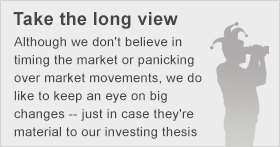
U.S. stocks finished at (another) record high yesterday, but they may not repeat the feat today, if this morning's small losses persist. The benchmark S&P 500 and the narrower Dow Jones Industrial Average (^DJI +0.17%) are down 0.1% and 0.19%, respectively, at 10:18 a.m. EDT. While the stock market is repriced on a near-continuous basis during the trading day, one unique, illiquid asset with an extremely limited supply is on auction as we speak. The auction, which is held annually, is only open for five days; with just three-and-a-half days remaining, the current high bid stands at $370,100. What is the asset in question? A steak lunch in New York (travel expenses not included) with billionaire investor Warren Buffett, CEO of Berkshire Hathaway (NYSE: BRK-A) (NYSE: BRK-B). My question today: Is it possible on an economic basis to justify paying six or seven figures for lunch with Buffett?
In Good Will Hunting, the self-educated prodigy Will Hunting embarrasses an arrogant Harvard graduate student in a Cambridge bar before concluding his withering put-downs by observing that: "You dropped a hundred and fifty grand on an education you coulda' picked up for a dollar fifty in late charges at the public library."
I can't help but recall that scene when I think of a wealthy investment manager plonking down hundreds of thousands or millions of dollars to have lunch with Buffett. I'm tempted to paraphrase Will Hunting with: "You dropped $3.5 million [the winning bid in 2012 and record price to date] on some lunchtime wisdom you coulda' picked up for $20.62 at Amazon.com."
The latter figure is the cost of a complete compilation of Buffett's annual letters to his investors, beginning in 1965 through 2013. Reading, working through, and understanding those letters will put you well ahead of most investors -- including many professionals -- in terms of understanding intelligent investing and sound corporate governance.
Naturally, having Buffett's attention for several hours is worth a premium over reading his letters. After all, it's sort of like showing up at the Berkshire Hathaway annual meeting Q&A session and finding you're the only person there -- you get to set the agenda for the discussion.
In fact, based on the winning bid for the last year's auction (approximately $1.23 million), the value of the Buffett lunch has compounded at an annualized rate of 35% since 2000. That's an impressive return, particularly once you factor in a nearly two-thirds decline in the value of the winning bid between 2012 and 2013 (it seems there was a bit of a Buffett lunch bubble in 2012).
There are several purely economic arguments for paying a multimillion-dollar sum to have lunch with Buffett. For one thing, winning bidders are invariably investment managers -- typically hedge fund managers. A nugget of wisdom gleaned during the lunch that produces even a small improvement in investment approach or process can be very valuable indeed when it is deployed over the right-size asset base and the right investment period.
Furthermore, the supply of these lunches is becoming increasingly limited. With Buffett now 83, it's unlikely that there will be more than 10 to follow. Combine that constrained supply with some deep-pocketed bidders and it's no wonder the price of the asset skyrockets. Even with a million or multimillion-dollar price tag, winning bidders may yet be getting value for their winning-bid dollar.
Finally, the meetings can be serendipitous: Ted Weschler paid a total of $5.2 million to win the auctions in 2010 and 2011. He ended up closing his hedge fund and now works for Buffett, managing a billion-odd dollars on Berkshire Hathaway's behalf.







